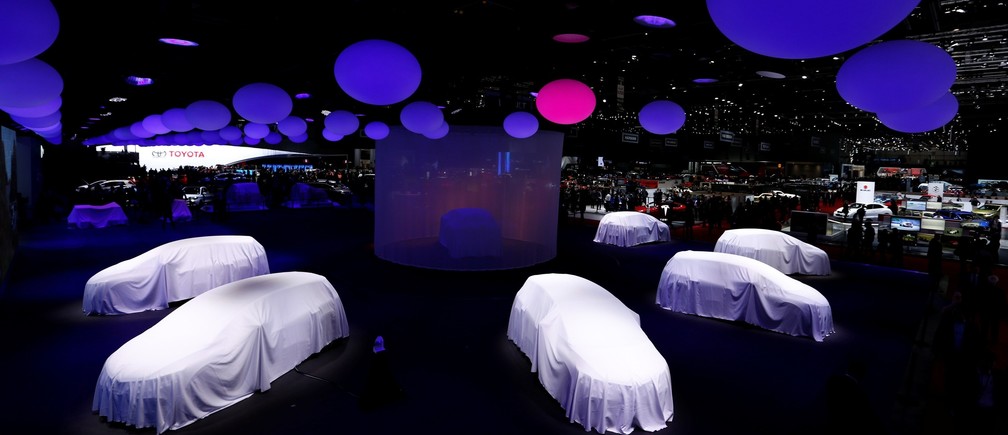Industry 4.0: business in the age of personalisation

Covered cars are pictured at the stand of Renault at the 86th International Motor Show in Geneva, Switzerland
Image: REUTERS/Denis Balibouse
Vittal Devarajan
Head, Marketing and Strategy, Engineering and Research and Development Services, HCL TechnologiesBejoy Joseph George
Global Sales Head, Aero, Auto and Industrial, Engineering and Research and Development Services, HCL TechnologiesStay up to date:
The Digital Economy
We are living in interesting times. The trends that underpin Industry 4.0 mean consumers are now on the cusp of a hyper-personalized era with fundamental changes in terms of choice, consumption, ownership and our overall experience of products and services.
Back in 1909, Henry Ford, pioneer of the production line, famously said that customers could ask for any color car as long as it was black. With the advent of competition, we soon had multiple models and variants to provide people with more choice. Manufacturers then took it one step further with configurable cars, with owners deciding what accessories to go with their car. Currently, high-end car manufacturers allow buyers to take part in the assembly of their car and choose everything from the paneling on the dashboard to the shade of the leather for the upholstery.
As competition intensifies, it is only a matter of time before even a first-time car buyer will be able to purchase a car with his or her very own shade of blue. Also, with the advent of technology, there are quite a few unconventional tech competitors who are approaching the car market from different perspectives like Tesla (with electric cars), and Google (with autonomous cars) etc. All of them rely heavily on technology to provide a hyper-personalized experience, whether that's an automatic update of the software in the car to improve safety features or the launch of a new service to improve the driving experience.
Software is allowing an easy transition from products to services. After all, the primary function of a car is to transport people from one place to another, not to sit on a driveway. Hence by providing mobility services rather than just vehicles, a car manufacturer can provide a fuel-efficient ride to an office-goer during the day and a comfortable luxury ride to the same person and his partner to a place of entertainment in the evening. Given the context, the service can be personalized and even priced differently.
If the same car can be configured for office commuting as well as evening occasions, for some consumers it does away with the need to have multiple cars. Other aspects of service in terms of regular maintenance and upkeep can also be bundled as a service making the overall experience of owning the car more straightforward and pleasurable. Thanks to disruptive technologies like Internet of Things, we are moving towards “Everything as a Service”.
Most people purchase products so they're there when they need them, as well as sometimes for a sense of status.
However, if one can get the same status and convenience without the aspect of ownership, everything changes. This has already happened with private jets thanks to the influx of capital involved and the concept of leasing and paying in terms of flying hours. If a car manufacturer can provide quality and availability of the right car for the right ride, it would be a matter of time before even cars would follow a similar business model. The maturing of autonomous driving technologies are rapidly moving us towards this course.
Another aspect of ownership which is also moving towards hyper-personalization is the purchase. With the world converging towards customer-centricity, pretty soon we will be paying for all the different parts of the car - from the entertainment system to tyres and safety systems - in terms of miles or kilometers with multiple manufacturers collaborating. This is already happening to a certain extent in aerospace, with engines being paid for flying hours and braking systems being paid for landings.
The convergence of software can ensure that we enjoy a seamless entertainment experience of say, watching a movie at home and continuing to see the rest of it in the car. The same thing goes for working in an autonomous driven car during office hours while being connected to the secure office network, and so on.
We are on the cusp of a hyper-personalized society, where consumers will tailor their own experiences.
One word of caution here: what goes out of fashion will soon come back. Chances are that too much choice might also result in people asking for a simple “Black Model T”.
Don't miss any update on this topic
Create a free account and access your personalized content collection with our latest publications and analyses.
License and Republishing
World Economic Forum articles may be republished in accordance with the Creative Commons Attribution-NonCommercial-NoDerivatives 4.0 International Public License, and in accordance with our Terms of Use.
The views expressed in this article are those of the author alone and not the World Economic Forum.
Forum Stories newsletter
Bringing you weekly curated insights and analysis on the global issues that matter.
More on Fourth Industrial RevolutionSee all
Markus Kirchschlager and Benedikt Gieger
July 10, 2025
Ayed Abdulhadi Al-Ruwaili
July 8, 2025
Ben Colman
July 7, 2025


